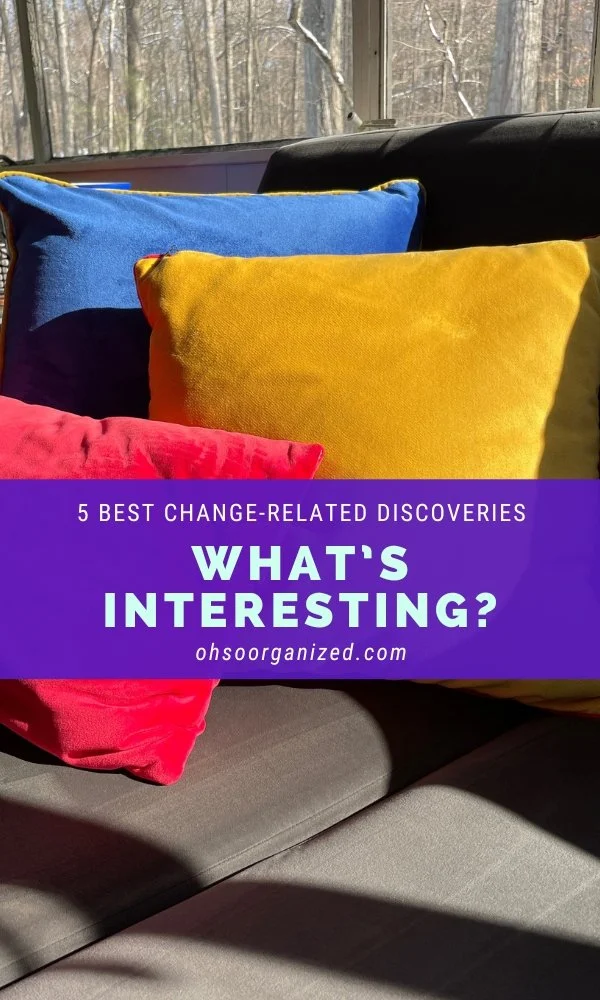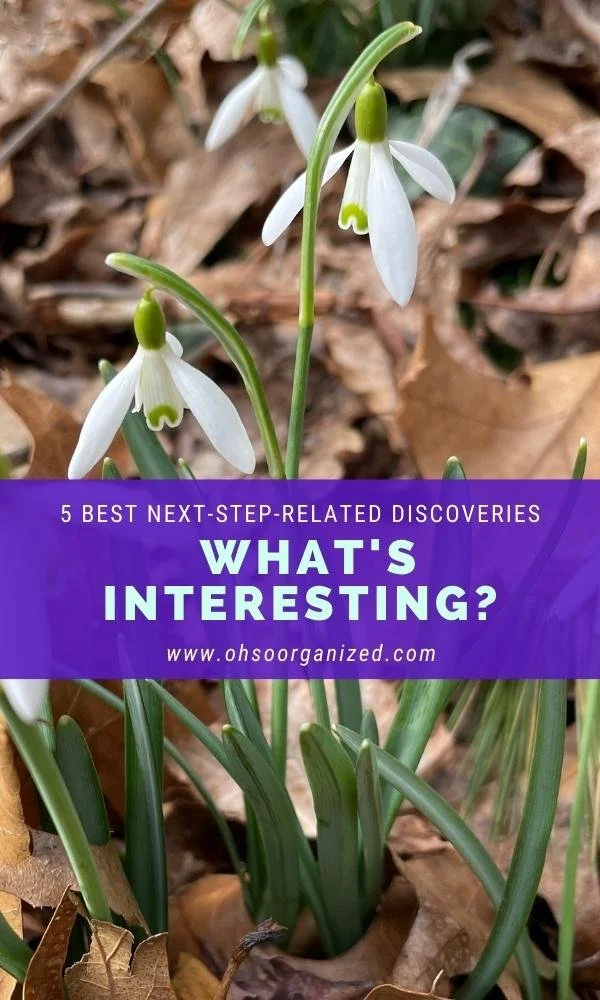This is the newest release (v48) of the “What’s Interesting?” feature, with my latest finds that inform, educate, and relate to organizing and life balance. These unique, inspiring change discoveries reflect this month’s blog theme.
You are an engaged, vibrant, and generous group. I am deeply grateful for your ongoing presence, positive energy, and contributions to this community. I look forward to your participation and additions to the collection I’ve sourced.
What do you find interesting?
What’s Interesting? – 5 Best Change Discoveries
1. Interesting Read – Liberating Change
Taking inventory of where you are right now, you might have a mile-long list of all the changes you’d like to make. Overwhelm most likely accompanies that list. After all, it’s nearly impossible to successfully pursue multiple changes simultaneously.
Meditations for Mortals – Four Weeks to Embrace Your Limitations and Make Time for What Counts by best-selling author Oliver Burkeman is not about being more productive but selective.
Burkeman says, “The list of worthwhile things you could in principle do with your time will always be vastly longer than the list of things for which you’ll have time.”
Additionally, “when you give up the unwinnable struggle to do everything, that’s when you can start pouring your finite time and attention into a handful of things that truly count.”
The four themed weeks (Being Finite, Taking Action, Letting Go, and Showing Up) include twenty-eight short chapters intended to be read one day at a time. These chapters are digestible and inspiring, encouraging small, achievable changes in perspective and action. By embracing imperfection, accepting limitations, combating distractions, and more, you will learn how to live with less stress and more purpose.
2. Interesting Trend – Emotional Change
Have you ever noticed something that makes you do a double-take? Recently, I saw a Tiny Buddha post on Instagram that made me do just that. It took me a few moments to sound out the word exhausterwhelmulated and digest what it meant.
This adjective is “the feeling of being exhausted, overwhelmed, and overstimulated all at once.” Does this sound familiar? Have you felt this way lately?
With all that’s happening in the world, many of us feel exhausterwhelmulated. If this describes your experience, embrace the changes you have agency over.
If you’re exhausted, prioritize your sleep hygiene.
If you’re overwhelmed, remove or delegate some tasks.
If you’re overstimulated, take a hiatus from social media and news scrolling.
Embrace the changes that will bring you energy, clarity, and calm.
3. Interesting Resource – Change
How are your decluttering and organizing goals coming along? Are you filling bags with clothing, home goods, and books to donate? Or are you thinking about taking action but haven’t begun yet?
Making a change by curating your environment can yield energizing results for you and others. Being intentional by keeping your most valued and useful items and releasing what has overstayed its welcome brings many positives.
First, your environment will better support who you are, what you use, and what you treasure. Second, donating items and letting go of what you no longer need will allow someone else to enjoy them.
One of the easiest-to-use donation sources is GreenDrop®. You can schedule a pick-up online or visit a donation center. I use them, as do many of my clients. GreenDrop® accepts books, clothing, electronics, linens, games, housewares, small appliances, small furniture, and more.
This resource makes the exit strategy for your things so much simpler.
“Embrace the changes that will bring you energy, clarity, and calm.”
4. Interesting Product – Joyful Change
Living in the digital age, we spend a lot of our time interacting with technology. Sometimes, I wonder if pens and paper will become obsolete. I sure hope not. As someone who receives immense tactile pleasure from using such implements, I thought you might feel similarly.
Don’t get me wrong. I also enjoy using my tech tools, like my keyboard to write blog posts or my voice to ask Siri questions. However, there are many situations when pen and paper are my preferred tools.
I discovered Karst’s Stone Paper™ journals. The paper is made from “100% recycled stone and without any trees, bleaches or acids.” It’s “durable, more sustainable, and infinitely smoother to write, scribble, doodle or draw on.” The paper is also waterproof and tear-resistant.
My newest meditation journal has stone paper. It’s a beautiful writing experience that allows my thoughts to flow and my pen to glide one word at a time. What a simple way to bring about a joyful change.
5. Interesting Thought – Positive Change
Have you noticed that change takes time? Whether making intentional positive changes or navigating unexpected ones, time and patience are essential ingredients.
The most frequent emotion I notice when making changes is feeling impatient. You want what’s on the other side, yet sustaining the effort to get there can be challenging.
This simple yet powerful phrase, “I am in the process of positive changes,” reminds us of the patience piece while also nurturing confidence and proactive participation.
You can do this. You are doing this!
Can you share one change-related discovery? Which of these resonates with you? I’d love to hear your thoughts and invite you to join the conversation.
Do you want help getting unstuck, reducing overwhelm, getting organized, and making changes? If so, I’m here for you. Contact me, Linda, at linda@ohsorganized.com, call 914-271-5673, or schedule a Discovery Call. Change is possible, especially with support.
























